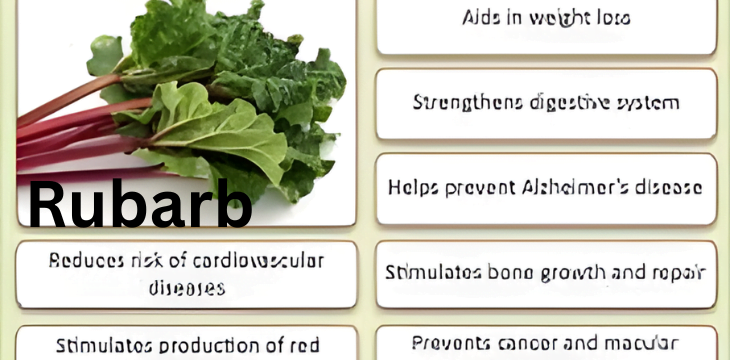Discover the incredible health benefits of Rubarb in this comprehensive article. Learn about its nutritional value, potential medicinal properties, and how to incorporate this superfood into your diet.
Table Of Contents
Introduction
Rubarb, often associated with delicious pies and crumbles, is more than just a tasty treat. This humble vegetable packs a nutritional punch and offers a plethora of health benefits. In this article, we’ll delve into the surprising advantages of incorporating rhubarb into your diet, exploring its various health-promoting properties and how it can contribute to your overall well-being.
Understanding Rhubarb: A Brief Overview
Before we dive into its health benefits, let’s take a closer look at what rhubarb is and its nutritional composition.
What is Rubarb?
Rhubarb, scientifically known as Rheum Rubarb, is a perennial vegetable with tart-flavored stalks. It belongs to the Polygonaceae family and is native to Asia.
Nutritional Profile of Rubarb
Despite its low calorie count, Rubarb is packed with essential nutrients, including vitamins, minerals, and antioxidants. It’s particularly rich in vitamin K, vitamin C, calcium, and potassium.
Health Benefits of Rubarb
1. Promotes Digestive Health
Rubarb is a rich source of dietary fiber, which plays a crucial role in maintaining digestive health. Fiber helps regulate bowel movements, prevents constipation, and supports a healthy gut microbiome.
2. Supports Heart Health
The presence of potassium in Rubarb makes it beneficial for heart health. Potassium helps regulate blood pressure levels, reducing the risk of hypertension and cardiovascular diseases.
3. Aids Weight Loss
With its low calorie and high fiber content, Rubarb is an excellent addition to weight loss diets. The fiber helps promote satiety, preventing overeating, while the low calorie count supports calorie deficit for weight loss.
4. Rich in Antioxidants Rubarb
Rubarb contains antioxidants like anthocyanins and polyphenols, which help combat oxidative stress and inflammation in the body. These compounds may lower the risk of chronic diseases, including cancer and diabetes.
5. Supports Bone Health
Vitamin K, found abundantly in rhubarb, is essential for bone health as it aids in calcium absorption and bone mineralization. Including rhubarb in your diet may help maintain strong and healthy bones.
6. Boosts Immune Function Rubarb
The vitamin C content in Rubarb contributes to a healthy immune system by stimulating the production of white blood cells and enhancing the body’s defense against infections and illnesses.
7. May Aid in Blood Sugar Control
Some studies suggest that certain compounds in Rubarb may have antidiabetic properties, helping regulate blood sugar levels. However, more research is needed to confirm these effects.
Incorporating Rubarb into Your Diet
Now that you’re aware of the numerous health benefits of Rubarb, here are some delicious ways to incorporate this versatile vegetable into your meals:
- Add chopped rhubarb to fruit salads or yogurt for a tangy twist.
- Use stewed rhubarb as a topping for oatmeal or pancakes.
- Incorporate rhubarb into savory dishes like chutneys or sauces to complement meats or tofu.
- Enjoy rhubarb in baked goods such as pies, crisps, or muffins for a delightful dessert.
FAQs (Frequently Asked Questions)
Q: Can I eat rhubarb leaves?
A: No, rhubarb leaves contain toxic compounds, such as oxalic acid, and should never be consumed. Only the stalks of rhubarb are edible.
Q: Is rhubarb high in sugar?
A: Despite its tart flavor, rhubarb is relatively low in sugar, making it a suitable choice for individuals watching their sugar intake.
Q: How should I store fresh rhubarb?
A: Store fresh rhubarb stalks in the refrigerator, wrapped in a damp paper towel and placed in a plastic bag. They should remain fresh for up to a week.
Q: Can I freeze rhubarb for later use?
A: Yes, you can freeze rhubarb for future use. Wash and chop the stalks, then spread them in a single layer on a baking sheet and freeze until solid. Transfer the frozen pieces to a freezer bag or container for long-term storage.
Q: Is rhubarb safe to eat during pregnancy?
A: While rhubarb is generally safe to eat in moderation, pregnant women should consult their healthcare provider before consuming it, as excessive intake may pose risks due to its oxalic acid content.
Q: Are there any drug interactions with rhubarb?
A: Rhubarb may interact with certain medications, particularly blood thinners like warfarin. If you’re taking any medications, consult your healthcare provider before adding rhubarb to your diet.
Conclusion
In conclusion, Rubarb is not only a delicious addition to various culinary creations but also a nutritional powerhouse with numerous health benefits. From supporting digestive health to boosting immunity and promoting heart health, this versatile vegetable deserves a place on your plate. So, why not embrace the tangy goodness of rhubarb and reap its many rewards for your well-being?


